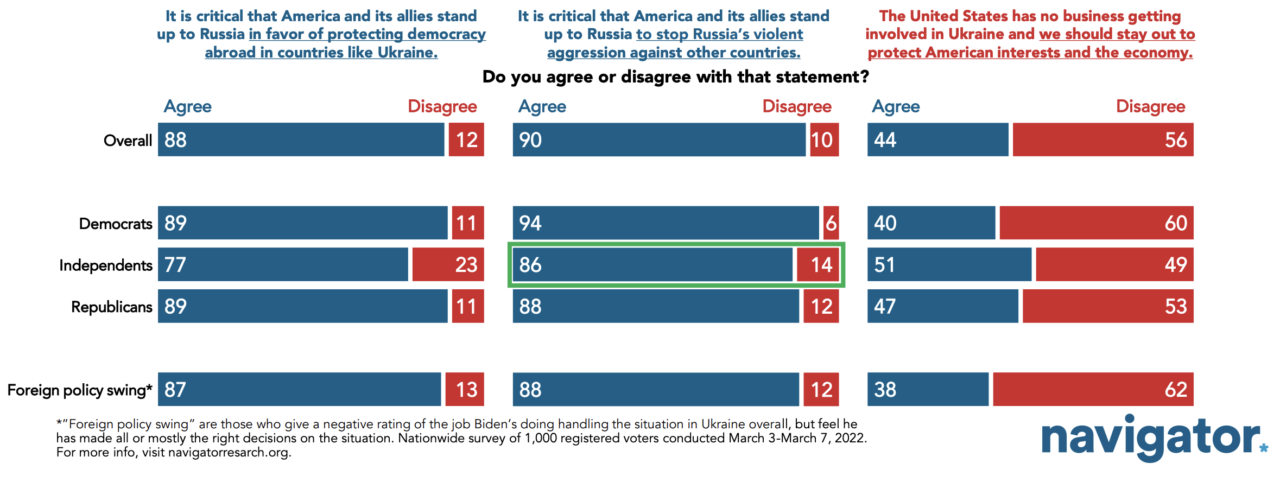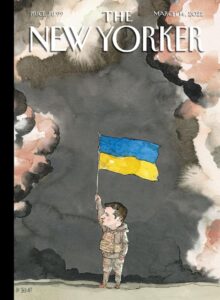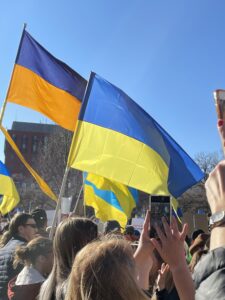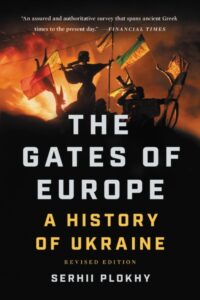
Some 78% of Americans see the Ukraine war as a fight for global democracy rather than solely as a regional conflict, according to a new Citizen Data survey, Jennifer Rubin writes for The Washington Post.
Another poll from Navigator finds that although 63 percent of all respondents are worried about “increased gas prices as a result of sanctions on Russia,” 86 percent still support the sanctions, including 60 percent who strongly support them. Ukraine and President Volodymyr Zelensky draw over 70 percent approval; more than 80 percent view Russia and President Vladimir Putin unfavorably, Rubin adds.
“Roughly nine in ten [respondents] agree with statements about standing up to Russia, whether to protect democracy abroad or to stop Russia’s violent aggression,” Navigator reports (above). “On a statement that the U.S. should stay out of Ukraine, 56% disagree,” including 53 percent of Republicans.
 Though the invasion of Ukraine has been a sea change in European thinking toward Russia, it’s far from clear whether there is agreement across the West that a civilizational battle is being fought between East and West, between democracy and autocracy, argues analyst Tom McTeague.
Though the invasion of Ukraine has been a sea change in European thinking toward Russia, it’s far from clear whether there is agreement across the West that a civilizational battle is being fought between East and West, between democracy and autocracy, argues analyst Tom McTeague.
On top of the short-term challenge of the war in Ukraine, there is an altogether more difficult long-term challenge to the Western order. Put bluntly, it is possible both to believe that Putin’s invasion of Ukraine will be a disaster for Russia, giving the West a much-needed shot in the arm, and to believe that the challenges the West faces from disrupting states like Russia will remain daunting in their enormity, he writes for The Atlantic:
In some ways, the big picture remains unaltered by the blood-drenched catastrophe in Ukraine: The West faces a Chinese-Russian alliance seeking to reshape the world order, one that Richard Nixon and Henry Kissinger spent so much political capital to avoid. Only now, instead of this axis being led by an autarkic and sclerotic Muscovite empire, the senior partner is a technologically sophisticated giant that is deeply integrated in the world economy.
The challenges today are new, and so new institutional scaffolding is required to rebalance the Western world’s share of rights and responsibilities; to unite the liberal democratic world; to ensure its primacy over autocratic challengers, McTeague suggests. Instead, Western leaders talk about the reinvigoration of the institutions designed in the aftermath of the last world war to ensure a new one did not begin.
 Ukraine represents Europe’s chance for renewal, argues Timothy Snyder, a professor of history at Yale University. In order to stop this war, the EU must continue the route it has chosen of economic sanctions on Russia which are far more costly to Europeans than the U.S. sanctions are for Americans.
Ukraine represents Europe’s chance for renewal, argues Timothy Snyder, a professor of history at Yale University. In order to stop this war, the EU must continue the route it has chosen of economic sanctions on Russia which are far more costly to Europeans than the U.S. sanctions are for Americans.
But the EU must go beyond that. It must assert that it is capable of moral, political, and intellectual renewal. Its leaders must show that they have a vision of the future that draws from the history of war and helps bring this one to an end, he writes for Foreign Policy.
‘Watershed moment’?
 What we have witnessed in recent months is the closest we have come in many decades to the events that triggered the declaration of the Truman Doctrine in 1947, says William A. Galston, a senior fellow at the Brookings Institution, a former National Endowment for Democracy (NED) board member. If Biden rises to the occasion, he could become the Harry Truman of the 21st century. If he does not, history will not remember him kindly, he writes for American Purpose.
What we have witnessed in recent months is the closest we have come in many decades to the events that triggered the declaration of the Truman Doctrine in 1947, says William A. Galston, a senior fellow at the Brookings Institution, a former National Endowment for Democracy (NED) board member. If Biden rises to the occasion, he could become the Harry Truman of the 21st century. If he does not, history will not remember him kindly, he writes for American Purpose.
There is a “very high probability” of another Grozny, says a military expert. Russia is pursuing a scorched earth policy targeting civilians which is deliberately designed not only to eradicate the population but the culture of the nation, according to retired Lt. General Mark Hertling, the former commanding general of U.S. Army Europe and 7th Army. Ukraine “will defeat the Russian army,” he tells The Bulwark’s Charles Sykes.
Consequently, Russia is likely to become an “irrelevant failed state’ as the four dimensions of national power – diplomatic, informational, military and economic – are corroded or lost. Putin will be a pariah, while Ukraine should eventually become a beacon of prosperity as the result of a new version of the Marshall Plan, Hertling states.
 At this point, as the “blitzkrieg” is stalling, Putin is not folding but raising the stakes, unleashing boundless cruelty, no matter how brutal the sanctions are, adds Josef Joffe, who teaches international politics at the Johns Hopkins School of Advanced International Studies. Putin may be creepy, but he is a ruthless opportunist. He will consolidate and up the ante while he negotiates, waiting for the West to lose its startling cohesion and willpower, he writes for American Purpose.
At this point, as the “blitzkrieg” is stalling, Putin is not folding but raising the stakes, unleashing boundless cruelty, no matter how brutal the sanctions are, adds Josef Joffe, who teaches international politics at the Johns Hopkins School of Advanced International Studies. Putin may be creepy, but he is a ruthless opportunist. He will consolidate and up the ante while he negotiates, waiting for the West to lose its startling cohesion and willpower, he writes for American Purpose.
In A History of Ukraine, Serheii Plokhy relates how Ukrainians’ toughness, courage and ruthlessness confounded waves of invaders grasping for the region’s strategic advantages and natural riches, including the Kyivan Rus’, the Byzantine Empire, the Ottomans, the Mongols, Poles and Lithuanians, Russian tsars, Germans, the Soviet Union and now Vladimir Putin’s Russia, The Los Angeles Times reports.
Similarly, Anne Applebaum’s Red Famine: Stalin’s War on Ukraine tells the horrific story of Ukraine’s treatment at the hands of Stalin in the 1930s, resulting in a catastrophic famine, the most lethal in European history, in which 3 million Ukrainians died.
It’s far from clear whether there is agreement across the West that a civilizational battle is being fought between East & West, between democracy & autocracy, @TomMcTague writes for @TheAtlantic #StandWithUkriane https://t.co/RIRTfQRF0e
— Democracy Digest (@demdigest) March 10, 2022







